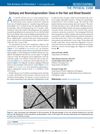 9 citations,
January 1997 in “Gynecological Endocrinology”
9 citations,
January 1997 in “Gynecological Endocrinology” The document concludes that treating androgen excess needs patience, managing expectations is important, and many drugs used are not officially approved, suggesting cosmetic options for mild cases.
11 citations,
January 2010 in “Springer eBooks”  2 citations,
January 2018 in “European journal of pediatric surgery reports”
2 citations,
January 2018 in “European journal of pediatric surgery reports” A baby girl's hair turned straight on one side due to a neck tumor and surgery, but it returned to curly as she recovered.
 April 2003 in “Experimental Dermatology”
April 2003 in “Experimental Dermatology” The workshop highlighted the genetic links and psychological impacts of hair loss and skin disorders.
 16 citations,
April 2012 in “Journal of mammalogy”
16 citations,
April 2012 in “Journal of mammalogy” Young female Australian fur seals are losing hair due to low tyrosine and zinc levels and high pollution exposure.
 16 citations,
July 2002 in “Australasian Journal of Dermatology”
16 citations,
July 2002 in “Australasian Journal of Dermatology” A woman with lupus experienced skin death due to a blood clotting disorder after stopping a blood thinner, which healed with treatment.
 2 citations,
October 2018 in “The journal of pediatrics/The Journal of pediatrics”
2 citations,
October 2018 in “The journal of pediatrics/The Journal of pediatrics” The document concludes that specific hair and blood vessel abnormalities in infants with seizures and developmental issues may indicate Menkes disease, which lacks a cure and is often fatal by age 3.
 January 2016 in “Journal of clinical & experimental dermatology research”
January 2016 in “Journal of clinical & experimental dermatology research” New methods can diagnose hair loss by examining the scalp and can treat it with a mix of oral and topical medications, along with cosmetic procedures like hair transplants.
 7 citations,
May 2022 in “PLOS ONE”
7 citations,
May 2022 in “PLOS ONE” Certain genes and pathways are linked to the production of finer and denser wool in Hetian sheep.
 1 citations,
February 2009 in “Journal of Investigative Dermatology”
1 citations,
February 2009 in “Journal of Investigative Dermatology” VEGF helps squamous cell carcinoma grow in ways beyond just blood vessel formation.
 July 2002 in “Australasian Journal of Dermatology”
July 2002 in “Australasian Journal of Dermatology” Maintaining anticoagulation is crucial for patients with antiphospholipid syndrome.
 125 citations,
September 2001 in “The FASEB Journal”
125 citations,
September 2001 in “The FASEB Journal” Stress can cause hair loss by negatively affecting hair follicles and this effect might be reversed with specific treatments.
 51 citations,
January 2004 in “Skin Pharmacology and Physiology”
51 citations,
January 2004 in “Skin Pharmacology and Physiology” The document explains hair growth and shedding, factors affecting it, and methods to evaluate hair loss, emphasizing the importance of skin biopsy for diagnosis.
 20 citations,
October 2013 in “British Journal of Dermatology”
20 citations,
October 2013 in “British Journal of Dermatology” The document concludes that clinicians should be aware of common hair and scalp disorders in women of African descent and that more research is needed to develop effective treatments.
 1 citations,
July 2018 in “Elsevier eBooks”
1 citations,
July 2018 in “Elsevier eBooks” Avoid chemical and physical damage to protect hair.
 84 citations,
February 2013 in “Clinica chimica acta”
84 citations,
February 2013 in “Clinica chimica acta” Hair mineral analysis might help diagnose diseases early, but standard methods are needed.
 18 citations,
April 2013 in “Inflammatory Bowel Diseases”
18 citations,
April 2013 in “Inflammatory Bowel Diseases” People with Inflammatory Bowel Disease often lose hair due to stress, medication side effects, or lack of nutrients, and treatment depends on the specific cause.
 October 2023 in “Animal production science”
October 2023 in “Animal production science” Vitamin A deficiency changes cattle hair structure, while pregnancy may improve it, suggesting hair can indicate cattle health.
 28 citations,
July 2002 in “Australasian Journal of Dermatology”
28 citations,
July 2002 in “Australasian Journal of Dermatology” Lupus can look like hair loss from alopecia areata but needs different treatment.
 July 2002 in “Australasian Journal of Dermatology”
July 2002 in “Australasian Journal of Dermatology” A woman with lupus had hair loss and skin issues that were successfully treated with medications.
 15 citations,
September 2005 in “The Journal of the American Animal Hospital Association/Journal of the American Animal Hospital Association”
15 citations,
September 2005 in “The Journal of the American Animal Hospital Association/Journal of the American Animal Hospital Association” Trilostane effectively treated hair loss in Alaskan Malamutes with no adverse effects.
 28 citations,
January 2015 in “Skin appendage disorders”
28 citations,
January 2015 in “Skin appendage disorders” Children with trichotillomania often pull hair from their scalp, and parents may not notice; stress can trigger it, and asking detailed questions helps in diagnosis and treatment.

Accurate diagnosis and tailored treatments are crucial for managing hair loss in humans and animals.
25 citations,
April 2017 in “PloS one” Certain genetic variations in the FST gene are linked to better wool quality in Chinese Merino sheep.
 50 citations,
January 2007 in “PubMed”
50 citations,
January 2007 in “PubMed” Minoxidil 2% and 5% are common treatments for female pattern hair loss, with other options including anti-androgens, oral contraceptives, and hair transplantation.
 January 2009 in “Hair transplant forum international”
January 2009 in “Hair transplant forum international” Dr. Rodney Sinclair uses a detailed grading system to diagnose female pattern hair loss, recommends daily spironolactone and minoxidil for treatment, and believes genetics play a role in the condition.
 95 citations,
November 2018 in “Australasian journal of dermatology”
95 citations,
November 2018 in “Australasian journal of dermatology” Alopecia areata treatment varies, with no optimal method established yet.
 10 citations,
July 2002 in “Australasian Journal of Dermatology”
10 citations,
July 2002 in “Australasian Journal of Dermatology” Careful management of blood thinners is crucial for lupus patients with APS.
5 citations,
March 2017 in “Gene” CAP1 decreases the expression of a hair-related protein in young Tan sheep's skin.
26 citations,
February 2022 in “Journal of pineal research” Melatonin affects skin and hair color and protects skin cells, with potential benefits for hair growth and skin health.

























